EU and WHO deliver emergency life-saving supplies to flood-affected areas in Somalia
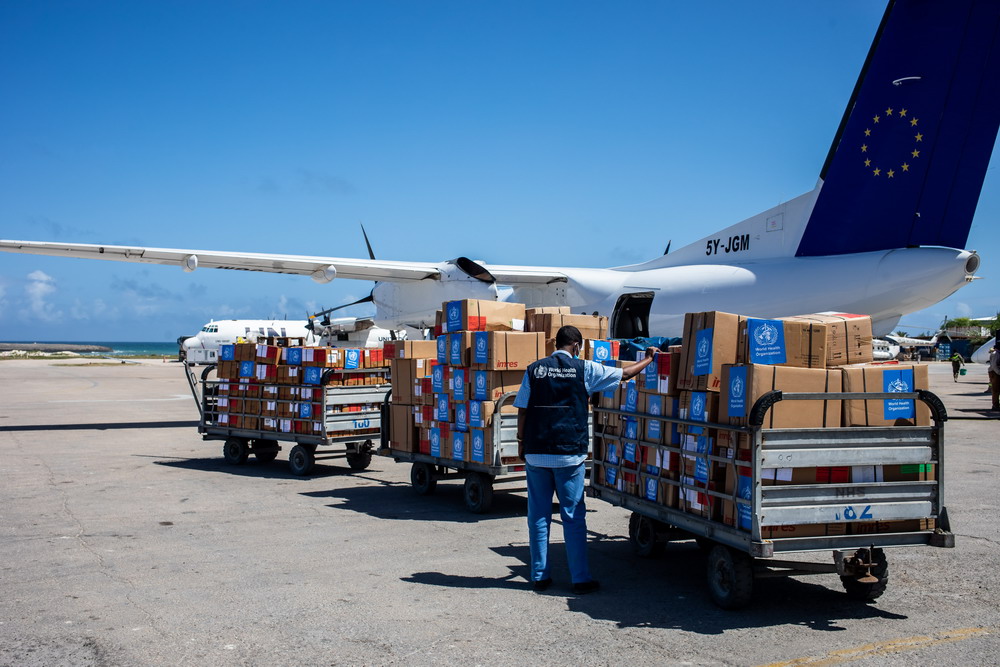
Mogadishu, 23 September 2020 – As part of continuous efforts to provide life-saving supplies to the most vulnerable Somalis, at the request of WHO, the European Union (EU) delegation to Somalia commissioned 2 special flights on 17 and 21 September to airlift emergency medical kits and supplies to Hirshabelle State. These supplies will be used to treat populations affected by flash floods in the state.
As soon as the Ministry of Health in Hirshabelle State noted an increase in the numbers of people contracting waterborne diseases, they alerted WHO to offer urgent support. The emergency supplies are being dispatched to the hardest-hit families, living around riverine areas in Balad, Beletweyne, Jalalaqsi, Jowhar and Mahaday.
“This is the fourth time this year that the EU delegation has shown immense and timely support to Somalia. Thanks to the swift action taken by them, and with guidance from the Ministry of Health in Hirshabelle, we have been able to support some of the worst-hit families,” said Dr Mamunur Rahman Malik, WHO Representative for Somalia. “We still have a long way to go to help prepare communities for disasters like this. Floods are recurrent along the Shabelle River, communities living in affected areas are at risk of being infected by waterborne diseases, like diarrhoea, and vector-borne diseases, in addition to COVID-19, which spreads easily where people live in confined areas.”
Both EU flights commissioned in the last week carried 7.2 tonnes and 29 cubic metres of emergency supplies from Mogadishu to Jowhar. The supplies include 51 Interagency Emergency Health (IEH) kits, each providing essential health care in emergency settings for up to 10 000 people over a 3-month period; 104 trauma kits allowing for 10 400 surgical interventions, to serve 5200 patients; 446 cholera kits capable of serving 44 600 patients, 32 surgical kits, each serving 100 patients; sample collection kits; tubes for sample collection and dengue testing kits; surgical instruments and one cholera treatment centre tent of 20 beds. Over 563 000 persons will benefit from these life-saving emergency medical supplies, which will stop further spread of waterborne diseases among communities living along the Shabelle River.
"Already vulnerable families in Beletweyne, Jalalaqsi, Jowhar, Mahaday and other communities along the Shabelle River are facing life and death situations as a result of flash floods, in addition to the challenges caused by COVID-19," the EU Ambassador to Somalia Nicolas Berlanga said. "The latest EU-commissioned flights are further evidence of the European Union’s commitment to the people of Somalia and our belief that we are more effective when we join hands with other organizations such as WHO Somalia. Our cooperation has and will continue to save lives."
Note to editors
This joint operation remains part of the bilateral coordination mechanism established between WHO Somalia and the Delegation of the EU to Somalia, which aims to strengthen operational response activities, including for COVID-19. On 3 May, EU flights also airlifted critical medical equipment and supplies from Mogadishu to Kismayo to support Jubaland State to respond to the COVID-19 outbreak. Following this intervention, on 20 and 21 May, the EU airlifted life-saving medicine and other emergency hospital supplies to Jowhar, Kismayo and Baidoa ‒ areas which were also affected recently by floods caused by heavy rains. Two other flights were organized on 11–12 June to airlift life-saving medicine and other emergency hospital supplies to Beletweyne, as well as medical and laboratory supplies to Hargeisa and Garowe. In addition, the European Civil Protection and Humanitarian Aid Operations (ECHO) has provided US $1.8 million to WHO’s COVID-19 preparedness and response operations in Somalia. WHO and the EU delegation to Somalia will continue to collaborate in the future, in efforts to reach the most vulnerable populations.
Related links
WHO and EU unite to fight COVID-19 in Somalia
EU and WHO unite to deliver critical life-saving supplies to flood-affected areas in Somalia
European Union and WHO Somalia deliver more emergency hospital supplies
For further information:
Mr Kyle DeFreitas
External Relations & Resource Mobilization Officer
WHO Somalia
Mob: +254-782-501-324
Email:
Ms. Fouzia Bano
Communications Officer
WHO Somalia
Mob: +252 619 235880
Email:
Mr Vicente Sellés
Delegation of the European Union to the Federal Republic of Somalia
Email:
WHO, UNICEF urge caregivers in south and central parts of Somalia to vaccinate children against polio, while observing health and safety measures for COVID-19
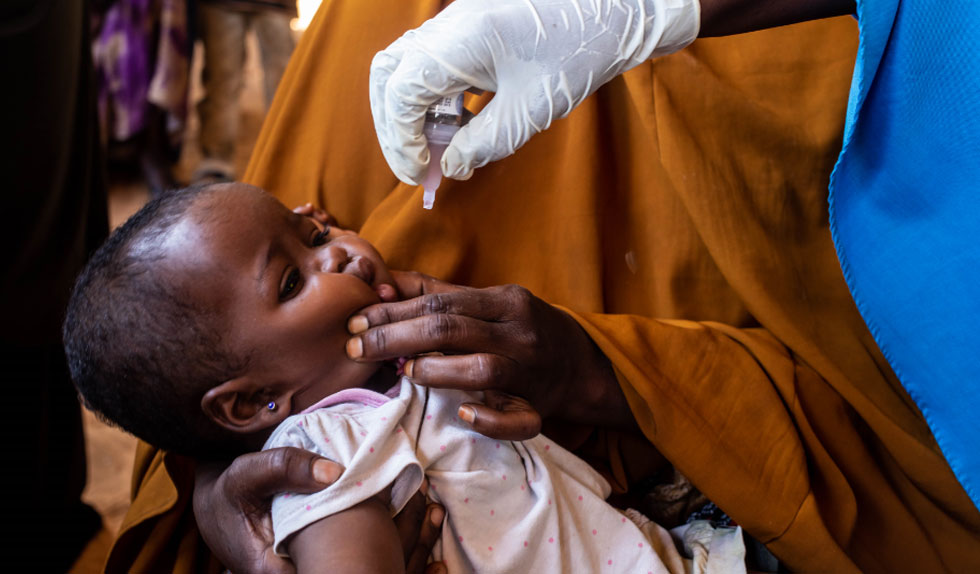
Mogadishu, 21 September 2020— The World Health Organization (WHO) and United Nations Children’s Fund (UNICEF) are urging parents and caregivers in south and central parts of Somalia to ensure all children aged under five are vaccinated against polio during a special house-to-house immunization campaign, which began yesterday and runs until 23 September. Both agencies are advising health workers and caregivers to observe health and safety measures against COVID-19 during the four-day campaign.
This advice comes in the wake of efforts to curb the spread of the ongoing polio outbreak in the south and central parts of Somalia. The strain of polio that is in circulation is different from the wild poliovirus, recently declared as eradicated from Africa, but it can also put communities where not enough children have been vaccinated at risk and leave children paralyzed for life. The outbreak has paralyzed 19 children since late 2017.
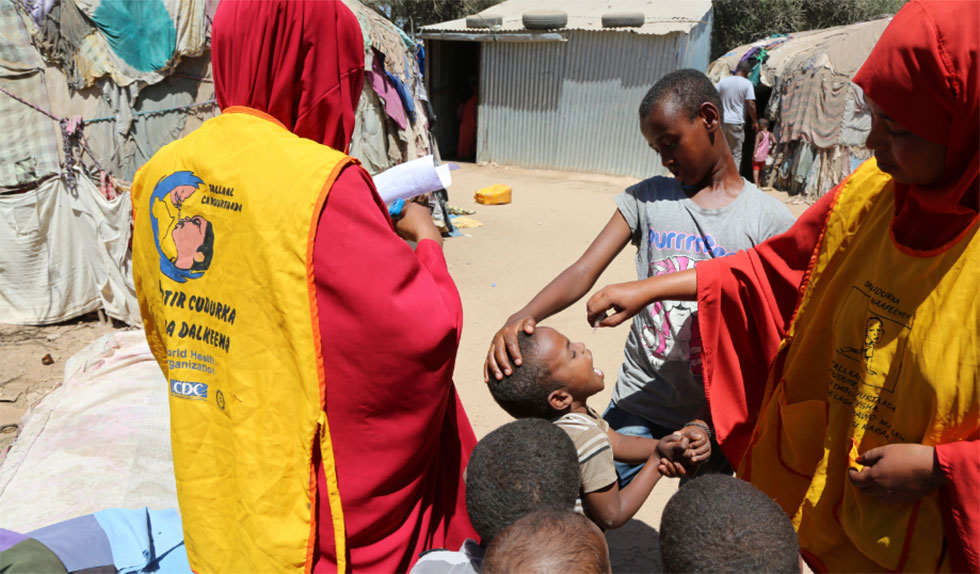
“The only way to stop such outbreaks from vaccine-preventable diseases, including polio, is to vaccinate every child every time immunization services are offered, either through routine programmes or through such mass campaigns. We all have a moral responsibility to reach and boost the immunity of every last child in Somalia. Owing to access, security and health-seeking behaviour, we are missing a large number of children every year, who are not receiving these life-saving vaccines,” said Dr Mamunur Rahman Malik, WHO Representative for Somalia.
During the ongoing campaign, 6266 vaccinators in urban areas and 2685 vaccinators in rural areas will be going from door to door to vaccinate 1.65 million children aged under five with oral polio vaccine. In efforts to reach every child possible, an additional 1125 team supervisors will be visiting households in targeted areas. 3390 community mobilizers, sensitizing target communities, will play a key role in helping families to understand, trust and accept vaccines.
“It is critical that all routine immunizations continue, especially during the COVID-19 pandemic,” said Werner Schultink, UNICEF Representative for Somalia. “These vaccination drives will help prevent further outbreaks and will protect children from deadly diseases so they can survive and thrive.”
Before the campaign, polio health workers were trained and supplied with personal protective equipment, including face masks, soap and hand sanitizer, to keep them and communities safe from COVID-19.
This campaign is the first step in a two-part effort to raise immunity levels among Somali children. Somalia’s Government, WHO and UNICEF will conduct the second part of the campaign in October to continue to strengthen the immunity of Somali children. Parents and caregivers are encouraged to accept the vaccine when it is offered to give their children life-long protection against polio.
For additional information, please contact
Fouzia Bano
WHO Somalia Communications Officer
Email:
+252 619 235880
Eva Hinds
UNICEF Somalia Communication Manager
Email:
Tel: +252 613 642635
Notes to editors
There are multiple strains of polio, and there is a critical distinction between wild or naturally occurring poliovirus, which is today only found in Afghanistan and Pakistan, and the strain circulating in Somalia today.
In late August 2020, the world celebrated a historic moment: the end of wild poliovirus in Africa. This achievement still stands. There is no wild poliovirus on the African continent. But other strains of polio remain a threat as long as there are communities with low immunity levels.
The only way to eradicate all strains of polio is to vaccinate all children everywhere against polio. In places where polio transmission has long been stopped and immunity levels are high, inactivated polio vaccine (IPV) is used. In places at high risk of poliovirus circulation, and where immunity levels are not as high as they need to be, the best tool for the job is the oral polio vaccine (OPV), which is being used in this vaccination campaign.
This polio campaign is supported by the Global Polio Eradication Initiative (GPEI), an organization dedicated to the eradication of polio. Launched in 1988, the GPEI is spearheaded by national governments, the World Health Organization (WHO), Rotary International, the US Centers for Disease Control and Prevention (CDC) and UNICEF, and supported by key partners including the Bill & Melinda Gates Foundation and GAVI, the Vaccine Alliance.
Somalia conducts successful first immunization campaign amid COVID-19
Somalia marks 6 months of COVID-19
16 September 2020 – Somalia is no stranger to emergencies. For decades, Somalis have passed down to younger generations their rich, vibrant culture, along with mechanisms to cope with all kinds of challenges they have faced over the years. Their resilience and Somalia’s health system have been tested yet again in the last 6 months ─ this time with the outbreak of coronavirus disease (COVID-19) in the country.
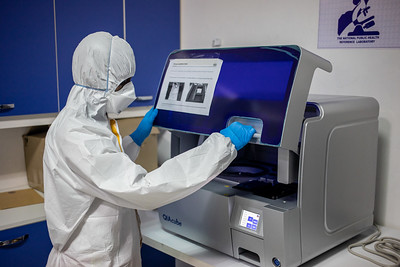 Even before 16 March 2020, when H.E. Fauziya Abikar Nur, the Federal Government’s Minister of Health, announced the first case of COVID-19 in the country, the United Nations agencies spearheaded by World Health Organization (WHO) provided substantial and timely support to the Federal Government of Somalia and its other Member States. This support allowed the country to prepare for what lay ahead. In February, public health measures for disease prevention, detection and response were significantly enhanced across the country. By early April, with support from WHO and other partners, the Ministry of Health had strengthened the capacity of 3 designated laboratories for COVID-19 testing. Since then, over 18 000 COVID-19 samples have been tested in these laboratories. WHO worked hand in hand with other United Nations agencies in the country, such as the International Organization for Migration (IOM), United Nations Children’s Fund (UNICEF), United Nations Development Programme (UNDP), United Nations Population Fund (UNFPA) and other national and international partners to improve preparedness, readiness and response to mitigate the early impact of COVID-19 outbreak.
Even before 16 March 2020, when H.E. Fauziya Abikar Nur, the Federal Government’s Minister of Health, announced the first case of COVID-19 in the country, the United Nations agencies spearheaded by World Health Organization (WHO) provided substantial and timely support to the Federal Government of Somalia and its other Member States. This support allowed the country to prepare for what lay ahead. In February, public health measures for disease prevention, detection and response were significantly enhanced across the country. By early April, with support from WHO and other partners, the Ministry of Health had strengthened the capacity of 3 designated laboratories for COVID-19 testing. Since then, over 18 000 COVID-19 samples have been tested in these laboratories. WHO worked hand in hand with other United Nations agencies in the country, such as the International Organization for Migration (IOM), United Nations Children’s Fund (UNICEF), United Nations Development Programme (UNDP), United Nations Population Fund (UNFPA) and other national and international partners to improve preparedness, readiness and response to mitigate the early impact of COVID-19 outbreak.
Swift response to the outbreak
WHO and its partners deployed 44 well-trained rapid response teams in March, now almost doubled to 73, to detect cases and to trace their contacts early on in the outbreak. More than 3300 frontline health workers have visited over 1.5 million households in the last 6 months, reaching approximately 6 million people, in 49 districts across the country. They played a critical role in reducing transmission and slowing the trajectory of the epidemic.
Dr Naima Abdullahi, WHO Public Health Emergency Officer for Banadir, is one of the lucky Somalis who gets to serve her country while fulfilling her dream.
“Since COVID-19 was confirmed in Somalia, I have been working in an isolation centre, at De Martino Hospital,” says Dr Naima. “My work includes providing support to Federal Ministry of Health teams to conduct COVID-19 tests, trace contacts, build capacity and manage cases. I also support with interpersonal communication, collecting data and conducting community awareness activities.”
Since I was a child, it was my dream to work for the United Nations, because my mother worked as a nurse at that time. Every time I saw her help children and women in our village, I used to tell her that I wanted to be like her,” adds Dr Naima.

Raising awareness to save lives
In efforts to increase awareness around COVID-19, in collaboration with WHO, UNICEF and other partners, the Somali Federal Government rolled out a public health campaign to raise awareness about COVID-19 in communities across the country. Key messages were shared using radio, billboards, face-to-face training and social media channels. Innovative ideas, including using chatbots, in Somali, on WhatsApp and Facebook Messenger, helped to spread awareness on self-care among online audiences.
To analyse epidemiological information on the COVID-19 outbreak in Somalia, the Federal Ministry of Health and WHO have been collecting information on COVID-19 prevalence across Somalia and publishing it in the form of a weekly situation report. They have also been updating an online dashboard on a daily basis.
Lauding the frontline health workers
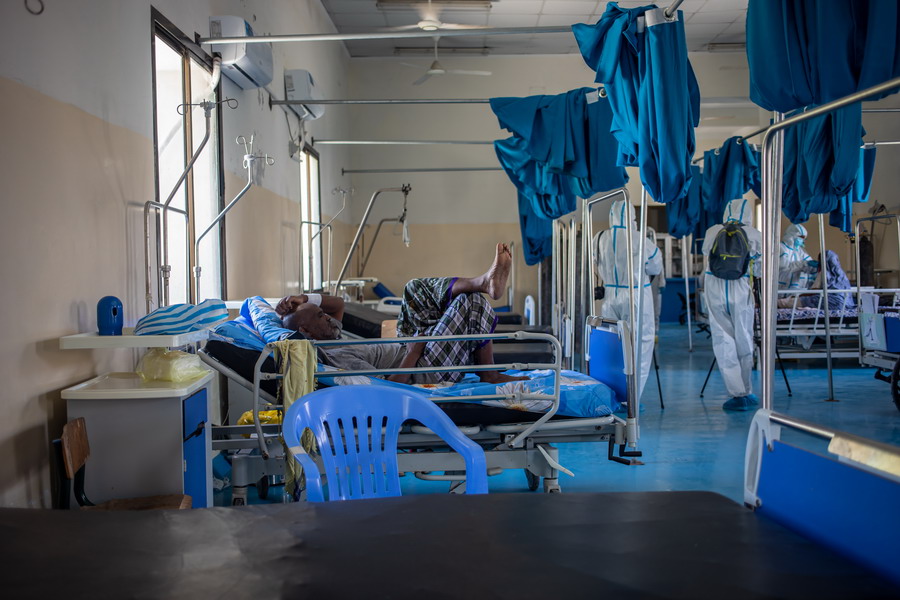
Health workers across the country have worked tirelessly to prevent the spread of COVID-19 and provide support to infected people. Despite over 250 health care workers being infected by COVID-19, their commitment, dedication, and tireless efforts in saving lives and reducing transmission in the last 6 months have earned recognition from all.
“The effort that Somali health workers have made to contain the pandemic and help those affected by the virus has literally saved lives. This heroic work is a testament to their commitment and dedication, often under extremely challenging conditions,” said the UN Secretary-General’s Special Representative for Somalia, James Swan.
“They achieved these life-saving outcomes despite a very fragile and weakened health system in Somalia – the result of 3 decades of conflict, protracted crisis and repeated humanitarian emergencies. The results show their fortitude, as well as the importance of the Somali authorities and national and international partners working together,” he added.
Teaming up to rebuild a robust health system
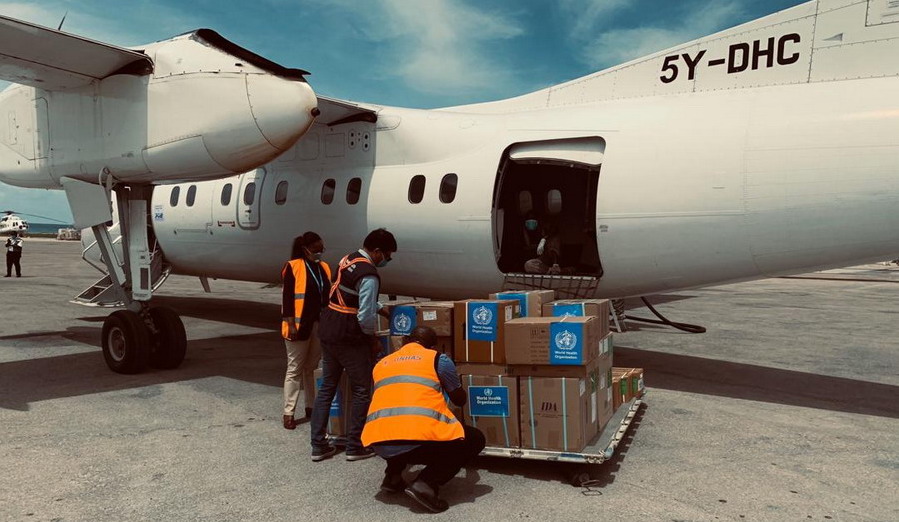
Close collaboration among United Nations agencies, and with health authorities, has helped mount a strong response to the outbreak. Despite the nationwide lockdown and suspension of commercial flights, the UN Assistance Mission in Somalia (UNSOM), World Food Programme (WFP) and WHO partnered to collect, transport and ship COVID-19 samples from remote and inaccessible parts of the country and hand over these samples to the designated testing laboratories.
Within the first 6 months of the outbreak, WFP transported 3279 samples collected from remote and inaccessible areas, shipped over 10 000 sample collection kits and 17 790 items of personal protective equipment throughout the country in support of the Federal Government.
Additionally, IOM, UNFPA, UNICEF and WHO supported 18 isolation centres across Somalia, providing them with ventilators, oxygen concentrators, intensive care unit beds and other equipment required for optimizing patient care. Over the last 6 months, over 560 patients received treatment and care in these isolation centres.
“We are all in this fight together. This unprecedented event required an unprecedented response. COVID-19 has affected all humanity and its impact on vulnerable countries like Somalia will be felt long after the outbreak ends. Acting as “One UN”, we responded in a timely, integrated and coordinated manner. The UN team in Somalia will continue to support the Government in protecting the most vulnerable Somalis and helping the health system recover from this crisis,” said Mr Adam Abdelmoula, Deputy Special Representative of the UN Secretary-General, and UN Resident Coordinator and Humanitarian Coordinator for Somalia.
Despite the ongoing pandemic, UNICEF, UNFPA and WHO continued to support the Federal Government to scale up essential health services in order to mitigate the negative impact of COVID-19 on health gains. The successful organization and completion of mass immunization campaigns against measles and polio in Banadir region targeting over 400 000 children under 5 years of age was a striking example of how United Nations agencies are supporting the Government to ensure that health gains are not reversed.
The outbreak is not over
“Even though we have seen a drop in the number of cases and deaths recently, the outbreak is far from over. We applaud the dedicated Somali health workers who continue to stand tall in the face of mounting challenges to save lives from COVID-19 and other diseases. I would like to remind everyone that no one is safe until everyone is safe. I urge Somali communities to do their part responsibly and sensibly and exercise caution to avoid getting infected by COVID-19. To our donor community, I extend our sincere gratitude for the support provided. We will continue to work together with our partners to strengthen the country’s public health system within the goal of achieving universal health coverage and building back better,” said Dr Mamunur Malik, WHO Somalia Representative.
The challenge for Somalia now is to continue to keep health workers like Dr Naima and communities across the country safe from COVID-19, monitor the transmission risk and prevent further spikes while maintaining routine and other emergency healthcare services for everyone, everywhere.



















